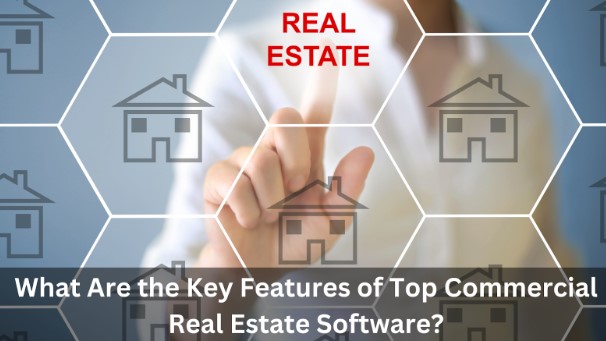How can the right software transform your commercial real estate business? Having the right tools is essential to turning opportunities into successes. The global real estate software market, valued at USD 10.24 billion in 2022, is projected to reach USD 25.39 billion by 2030, highlighting the growing demand for solutions that streamline operations.
Modern real estate professionals need solutions that enhance decision-making while providing a competitive edge.. This blog explores the essential features of commercial real estate software and how the right platform drives efficiency and growth.
Property Management Tools That Drive Results
The foundation of any commercial real estate software lies in its property management capabilities. Modern property management tools help streamline daily operations, ensuring more efficient workflows and better decision-making.
These systems offer necessary support to manage and track key aspects of a property’s life cycle, helping professionals maintain control over multiple properties and tenants at once. A strong commercial real estate software includes features like automated lease tracking and maintenance management to improve property oversight. These tools not only simplify management but also enhance operational efficiency, allowing businesses to focus on growth.
Lease Management and Tracking
Effective lease management is crucial for commercial real estate businesses. Top software solutions offer features like digital lease document storage, automated renewal reminders, tenant screening tools, rent roll tracking, lease expiration monitoring, and real-time rental income tracking.
Additionally, these systems may include built-in reporting tools for lease performance analysis and customizable lease templates to ensure compliance. These tools ensure that lease-related tasks are completed promptly and efficiently, reducing the risk of errors or missed opportunities.
Maintenance Management
Property maintenance is another essential area where real estate software can make a significant impact. Advanced software solutions automate work orders, vendor management, preventive maintenance scheduling, service request tracking, real-time status updates, and cost tracking for maintenance activities.
These platforms also often integrate asset management features to track the lifespan and condition of equipment and offer mobile access for maintenance teams, making it easier to manage requests and updates. These capabilities streamline maintenance processes, improve efficiency, and ensure that properties remain well-maintained.
Financial Tools for Better Decision-Making
Strong financial management sits at the heart of successful commercial real estate operations. Effective financial features within real estate software are essential for tracking income and expenses, ensuring accuracy, and maximizing profitability.
These tools help businesses maintain financial stability while streamlining processes for better decision-making, ultimately driving operational success.
Accounting Integration
Modern commercial real estate solutions integrate seamlessly with popular accounting software, providing a unified platform for financial management. Features like real-time financial reporting, automated bank reconciliation, invoice processing, tax document preparation, and budget tracking help businesses manage their finances with greater accuracy and efficiency.
Additional capabilities such as multi-currency support for international operations and customizable financial reports further enhance the software’s functionality. These integrations reduce manual errors and save time, ensuring that financial tasks are completed seamlessly.
Revenue Management
Revenue management features within real estate software help streamline income tracking and ensure timely payments. Automated rent collection systems make it easier to process payments and reduce late fees, while tools for income tracking and expense management provide comprehensive financial oversight.
The software also enables the tracking of security deposits and rent escalations, offering full visibility into tenant-related revenue streams. Financial forecasting capabilities help businesses plan for the future, offering insights that support informed decision-making and long-term profitability.
CRM Systems That Build Relationships
Customer relationship management tools help brokers and agents close 25% more deals. Here’s what to look for:
Contact Management
- Efficient lead tracking allows you to stay on top of potential clients and opportunities.
- Visualize the deal pipeline to track each stage of the sales process.
- Maintain a communication history to easily reference past interactions.
- Automate tasks to streamline workflows and improve productivity.
- Set follow-up reminders to ensure timely engagement with clients.
Marketing Integration
- Use email campaign tools to create and send targeted messages to clients.
- Syndicate property listings to increase exposure across multiple platforms.
- Manage social media accounts from a central platform for streamlined outreach.
- Capture leads through customizable forms embedded on websites.
- Analyze marketing performance with integrated analytics to optimize campaigns.
| Feature Category | Basic Package | Professional Suite | Enterprise Solution |
| Property Management | Basic lease tracking | Advanced lease management | Custom lease workflows |
| Financial Tools | Basic accounting | Full accounting integration | Advanced financial modeling |
| CRM Features | Contact Storage | Pipeline management | AI-powered lead-scoring |
| Analytics | Standard reports | Custom dashboards | Predictive analytics |
| Mobile Access | Basic mobile app | Full mobile features | White-label mobile app |
| Support | Email support | Email + Phone support | 24/7 dedicated support |
Analytics and Reporting Tools
Data-driven decisions are key to making informed, strategic moves in commercial real estate. Modern software platforms enable professionals to access valuable insights that enhance performance, improve outcomes, and support long-term growth.
These tools help businesses track and analyze important metrics, allowing for smarter decision-making across various aspects of operations.
Real-Time Dashboards
Real-time dashboards provide instant access to crucial property performance metrics. This includes tracking occupancy rates, revenue, and expenses, as well as monitoring market trends. These visual tools enable quick analysis of the business’s current status and allow for timely adjustments to strategies.
Custom Report Building
Customizable reporting features give users the ability to generate financial statements, property comparisons, portfolio analyses, and tenant reports.
These tailored reports provide in-depth insights into investment returns and performance across properties. With the flexibility to build reports according to specific needs, real estate professionals can focus on the data that matters most to their operations.
Mobile Access and Cloud Features
Remote work has become an essential part of the modern business landscape, requiring flexible solutions that allow professionals to stay connected and productive from anywhere. Top commercial real estate software offers mobile capabilities and cloud integration to ensure that teams can manage tasks, access data, and collaborate effectively, regardless of location.
Mobile Capabilities
Mobile solutions allow property inspection tools to be used on-site, enabling quick updates and real-time data collection. Document access ensures that all essential files are available wherever you go, while task management features help teams stay organized and on schedule.
Communication tools allow for seamless interaction among team members, and payment processing features ensure transactions can be completed on the go.
Cloud Integration
Cloud integration ensures that data is automatically synced in real-time across devices, providing consistent access to the most current information. With automatic backups, important files are secure, reducing the risk of data loss.
Cross-device access means professionals can work from any device, while remote file sharing and team collaboration tools ensure that projects run smoothly even when team members are working from different locations.
Document Management Features
Organized documentation is essential for saving time and reducing errors in commercial real estate operations. Central document storage allows for easy access to all files in one place, while e-signature integration streamlines the signing process.
Version control ensures that the most up-to-date document is always in use, and document templates help standardize paperwork. Secure file-sharing features enable safe and efficient collaboration, protecting sensitive information while improving workflow.
Investment Analysis Tools
Make informed investment decisions with advanced tools designed for real estate professionals. Property valuation models help determine accurate property worth, while ROI calculators assess potential returns.
Market analysis tools provide insights into trends and forecasts, and risk assessment features evaluate potential challenges. Investment tracking ensures that performance is monitored, providing a clear picture of investment success.
Conclusion
The right commercial real estate software combines property management, financial tools, and CRM capabilities to create a powerful platform for success. When choosing a solution, pay attention to the following criteria: integration, mobile access, reporting options, user experience, and support.
Consider your specific business needs and growth plans when choosing software. The right software must meet the current needs of the business but also grow along with the organization and keep up with competitive demands in today’s market.
FAQs
What is commercial real estate software?
Commercial real estate software refers to running and managing property listings, tracking leases, analyzing market trends as well as computing, ensuring maximum efficiency, and decision-making for property managers, agents, and investors.
What is a CRM in commercial real estate?
A CRM (Customer Relationship Management) in commercial real estate helps track client interactions, manage leads, organize communication, and improve client relationships, ultimately boosting sales and operational efficiency for agents and brokers.
What are the two main types of commercial real estate?
The two main types of commercial real estate are office buildings (business spaces) and retail properties (shopping centers, malls), both serving different business needs for leasing and investment purposes.







![chargecard-reviews-[latest-consumer-reports]:-is-it-worth-my-money?](https://dailyinvesthub.com/wp-content/uploads/2024/11/3120-chargecard-reviews-latest-consumer-reports-is-it-worth-my-money-420x280.jpg)
